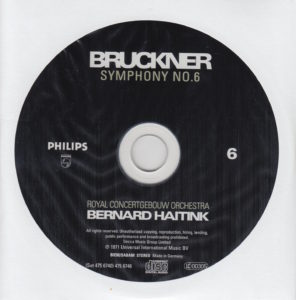
Two things I enjoy quite a bit: an empty restaurant early in the morning…combined with an empty space online awaiting my next blog entry.
I’m a morning person. No doubt about it. I love getting up well before the sun and going out somewhere to begin my day.
So here I sit listening to Bruckner, book at the ready, coffee mug within arm’s reach and nary another soul nearby.
I call this scenario “heaven.”
My wife would call it “hell.”
She is not a morning person.
 This morning’s conductor of Anton Bruckner’s Symphony No. 6 in A Major (WAB 106) is Dutch conductor Bernard Haitink (1929-).
This morning’s conductor of Anton Bruckner’s Symphony No. 6 in A Major (WAB 106) is Dutch conductor Bernard Haitink (1929-).
The orchestra is Royal Concertgebouw Orchestra.
I first encountered Maestro Haitink on Day 5 (Symphony No. 1) of my 144-day project.
Then again on Day 21 (Symphony No. 2).
And again on Day 37 (Symphony No. 3).
And again on Day 53 (Symphony No. 4).
And again on Day 69 (Symphony No. 5).
And, most recently, on Day 83 (Symphony No. 6 – from the Bruckner Collection box set).
It would be no exaggeration to say that I have been deeply impressed with Maestro Haitink. Whatever “it” is that makes a recording magical, his recordings usually have it.
But I’ll reserve the subjective stuff for later.
First, the objective aspects of this recording.
Bruckner’s Symphony No. 6 in A Major (WAB 106) composed 1879-1881
Bernard Haitink conducts
Haitink used the Haas edition
Royal Concertgebouw Orchestra plays
The symphony clocks in at 54:18
This was recorded in Amsterdam in December of 1970
Haitink was 41 when he conducted it
Bruckner was 57 when he finished composing it
This recording was released on the Philips label
Bruckner wrote his symphonies in four parts. The time breakdown of this one (Symphony No. 6 in A Major, edition unknown), from this particular conductor (Haitink) and this particular orchestra (Royal Concertgebouw Orchestra) is as follows:
I: Majestoso…………………………………………………………………………………………………….15:16
II: Adagio. Sehr feierlich (Very solemnly)……………………………………………………….17:25
III: Scherzo. Nicht schnell (Not fast) — Trio. Langsam (Slowly)………………………7:51
IV: Finale. Bewegt, doch nicht zu schnell (With motion, but not too fast)……13:27
Total running time: 54:18
Now, the subjective aspects.
My Rating:
Recording quality: 4 (some noticeable tape hiss at the start of Movement I)
Overall musicianship: 5
CD liner notes: 4 (essay translated into English, German, and French)
How does this make me feel: 4 (but very close to a 5)
One of the things I like a lot about Bruckner’s Sixth is its brevity.
A symphony that lasts less than an hour is perfect. That means, during the course of my blogging, I can hear it twice before rendering an opinion.
I’m eager (well, “eager” in the sense I’m intrigued) to discover long Lorin Maazel will stretch this brief symphony. Maestro Maazel seems to bloat his performances beyond the norm. But who am I to argue with the man? He was a world-famous conductor. I’m a schlub sitting in West Michigan writing about the world-famous conductors.
Back to today’s performance by Bernard Haitink and the Royal Concertgebouw Orchestra…
The recording is superb. The instruments have depth and presence without being piercing. Plus, and this is the really big plus for me, the performance doesn’t occupy a fuzzy mid range. I can hear highs and lows.
I can also, as I have been able to all along with Maestro Haitink’s performances, hear a good a mount of tape hiss, too. But that only adds to the feeling that this is a historic performance worthy of hearing some 46 years after it was recorded.
Movement I (Majestoso) is big and bold.
Movement II (Adagio) is, perhaps, my least favorite of the four movements. I don’t know why. It’s intricate and clever and expressive. But it doesn’t move me.
Movement III (Scherzo) is still my favorite. It packs a lot of cleverness into fewer than eight minutes, especially within the first minute. To my ears, this is one of the most powerful movements of any Bruckner symphony.
Movement IV (Finale) brings it on home in a dramatic way. A huge sound. Lots of energy.
I still think Bernard Haitink is one of the conductors to beat. Either he’s extremely lucky to get a great orchestra and superb sound engineers every time, or he’s a conductor who knows how to capture the sound in a room.
Highly recommended.
